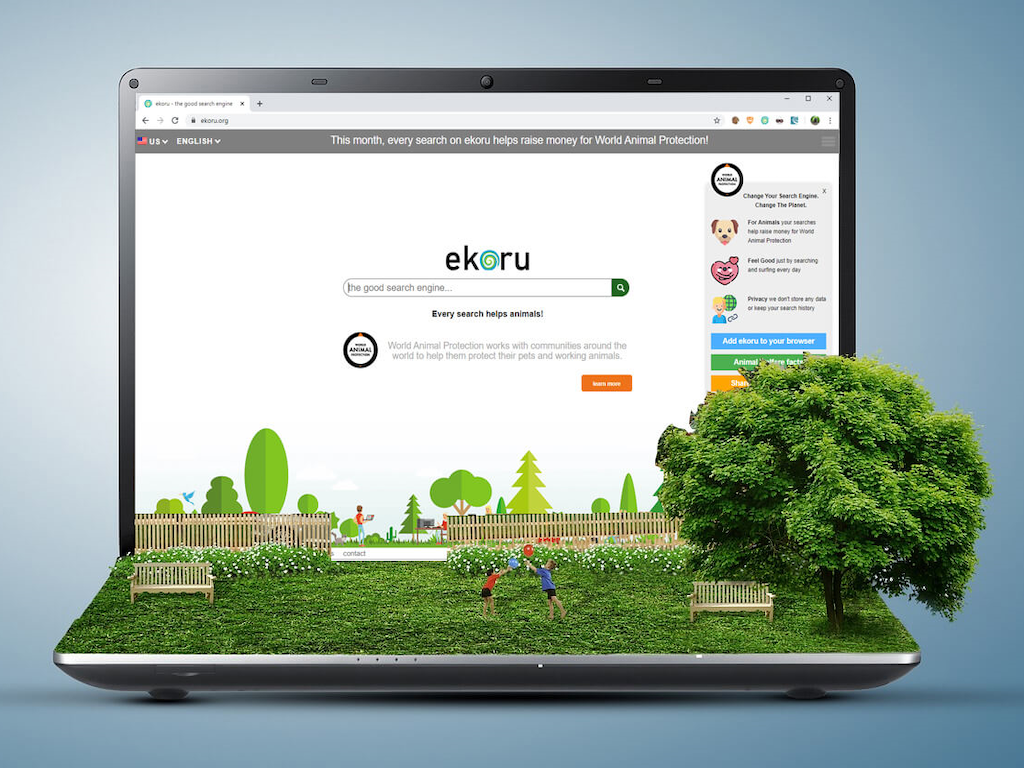3 Mins Read
Ekoru, a new hydro-electric powered search engine lets you browse the internet while helping clean ocean waste and keeping users’ data private. Founded this year by Australian techie Ati Bakush, Ekoru dedicates 60% of its revenue to climate change charities involved in animal welfare, reforestation and ocean conservation. The platform is among a number of digital solutions arising to help make a positive impact on our planet amidst our escalating ecological crisis.
Ekoru, a web search engine that works like Google, is hydro-powered and helps clean up plastic pollution and waste from our oceans by using the revenue they generate (mostly through advertising) to support organisations with a focus on solving our ocean waste crisis. Recent estimates suggest that on average, internet searches on Google produce 500kg of carbon dioxide per second. Ekoru, on the other hand, is powered by hydro-electricity – each server is cooled by water tubes, which eliminates the need for electric fans, and their data centre uses airflow instead of air conditioning. In addition, the engine sends 60% of its revenue to partners such as the Big Blue Ocean Cleanup, an organisation that helps clean coastal and marine environments worldwide. According to Ekoru, each web search on their engine helps remove 1 pound of ocean waste from our seas.
Currently, Ekoru is available as a browser extension on Chrome and Firefox, which automatically sets the site as the default search engine every day, as well as on an Android search app on mobile phones. While the company is still developing its iPhone-friendly search app, users can opt to simply point their browser at the Ekoru website when they plan to make a search online.
Given that the current state of ocean plastic pollution is detrimental to our natural ecosystems, individual actions like switching to using more eco-friendly search engines can make a difference Plastic waste has not only damaged corals and marine wildlife, its impact on whales in particular hinders our global efforts to fight climate change. As a recent IMF study found, whales are responsible for massive amounts of carbon capture on our planet, from absorbing carbon directly throughout their lifespan to being crucial to the existence of phytoplankton, which too captures a huge volume of our greenhouse gases.
Besides affecting the environment, plastic pollution harms human health and leaves behind a negative social impact. From microplastics entering back into the food chain through water contamination and seafood to damaging coral reefs and marine ecosystem that 300 million people in Asia’s coastal communities depend on for their livelihood, the detriment that plastic ocean waste has left behind is astonishing.
Ekoru is also a safer search engine for those concerned about their internet privacy. Unlike other web engines, Ekoru operates like the privacy-protecting search engine DuckDuckGo – they anonymise every search and all the data travelling between your browser and their servers are encrypted to prevent third-party tracking.
This works much like Ecosia, the tree-planting search engine that is privacy protecting as well. Ecosia has promised that 80% of their revenue goes to support reforestation programmes all over the world, and their server is currently powered by renewable solar energy.
Other companies, like Ecosia and Ekoru, have risen up to the challenge to provide digital solutions to global issues. Browser extension TreeClicks, for example, helps online shoppers offset the carbon of their purchases, while a new Singaporean app Capture, which is set to launch before the end of the year, helps users track the carbon footprint of their travels and offset them each month.
Lead image courtesy of Ekoru.




